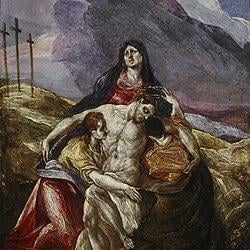Justin Thomas: I love when I find my thoughts are not original. It’s actually comforting to know that someone much more blessed with respect to intellect and spirituality has thought my thoughts.
Mark Wilson: I believe in that also. So here is an article that is full of these wise types of thoughts from a variety of everyday ordinary Catholics like myself. All pulled from Twitter and Facebook with the names slightly changed and some of the comments grammatically corrected, puffed up and expanded. They were originally all different conversations typed at different times, but the similar theme they all have makes them all fit together like a jigsaw puzzle.
Chris: So here are these chorus of Catholic voices discussing one of the big debates on the “Catholic internet” which is around the “reasonable hope all men are saved” theology that Bishop Barron and a large swath of Catholics promoting Balthasar’s thesis on “Dare We Hope That All Men Be Saved”. I must say that all of the thoughts being expressed are permitted speculation about the nature of hell, salvation and how many people end up there. It is one way of trying to envision and understand this very hard teaching of our church. Bishop Barron’s voice is a unique one on the topic as he seems to be a major figure with a minority opinion on the matter. So…
Dare We Have a Conversation About Hope?
Mark Wilson: Oh Great. Bishop Robert Barron is one of my favorite Catholic speakers and I would heartily endorse him to anyone. Safe and orthodox.
Ferny: Bishop Barron has endorsed this serious grave error about DWH that is contradictory to authentic official Church Teaching. So, I prefer to be careful about the information he promotes about anything. You can’t seriously really believe hell is empty. Yet Bishop Barron has endorsed the idea that we are talking about here. This is alongside rejecting the doctrine that we are saved through Our Lord Jesus Christ ALONE, even suggesting that you can find salvation in other religions. Poppycock. I’m not sure if you were aware of these heretical things he is teaching. Both ideas are wrong and neither are safe nor orthodox. STAY AWAY!
Mark Wilson: He does not endorse either of those ideas that you mentioned. It’s amazing that people keep disliking him for stuff he doesn’t actually believe. Quoting they guy Bishop Barron talks about quite often…
“Gregory of Nyssa, in contrast, tries to advance philosophical and theological arguments to prove that the pains of hell cannot be co-eternal with God. His main argument is based on the essential superiority of good over evil; for evil, in its essence, can never be absolute and unlimited. The sinner inevitably reaches a limit when all his evil is done and he cannot go farther, just as the night, after having reached its peak, turns toward the day. This reasoning corresponds to the example of a physician who allows a boil to mature until it can be lanced. Thus the Incarnation, too, occurred only when evil had reached its climax. Gregory’s position has never been condemned.”
― Hans Urs von Balthasar, Dare We Hope That All Men Be Saved?: With a Short Discourse on Hell – 2nd Edition
Tommy: Ferny If you actually watch his video on hell, he clearly believes in it. All he did was emphasize the hope in salvation. I’m reading his commentary on the gospel it’s very Orthodox and true to the faith. In fact, his Sunday recoded sermons are very good.
Ralphie: I think you should tread carefully when discussing the orthodoxy of any bishop.
Adriana: Sorry but very disappointed to know Bishop Barron’s true identity is showing itself. The son of Perdition is the only one who is glorified to any title of divination. Our Lord says in His word that those who do not repent will go to the lake of Fire and that the end times will be worse than the days of Noah. Hell does exist.
Chris: Ferny and Adriana, he had asserted that hell is real. He also has asserted that salvation is through Christ alone. You need to provide primary source citation if you’re going to claim this.
Dube: Dude! Are you making a distinction between finding salvation in other religions compared to despite following other religions?
Ferny: Dube Dude, yes those are definitely different things.
Dube: Fern, does (or can) God reveal any of the true (Catholic) Faith through other religions? If so, can this occur separately from His People? E.g., could the Greek philosophers have developed some accurate perspectives of God without obtaining them from the Jews, or could Native Americans have held some before the Catholic missionaries arrived?
Alex John: Ferny, That’s a pretty massive leap to go from Bishop Barron saying we can pray for the souls of anyone of any faith and hope that they could be saved through the grace of Christ, to Bishop Barron suggesting hell is empty and we don’t need Jesus to be saved. Why on Earth would someone devote their life to evangelization if they believed either of those statements were true?
BBH: Ferny where has the Church ever infallibly taught that any human was in hell? God has only definitively revealed that fallen angels are there. Any other statements about occupants or lack thereof is speculation that we are free to engage in.
Dube: BBH, It’s hardly “speculation;” it is a reasonable conclusion based on Jesus’s frequent warning about hell and private revelations from approved apparitions involving visions of people in hell.
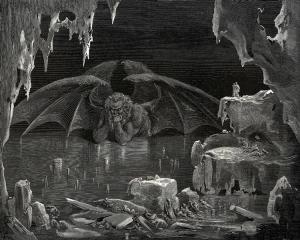
BBH: Dube “theological speculation” has a specific meaning. It refers to having an opinion on a subject that the Church has not definitively ruled on.
Ralphie: Dube Dude there is a distinct difference between “there are people in hell” and “THIS person is in hell.” The Church makes no statements that any particular person is in hell while stating that there are and will be people in hell. Private revelation is not required to be believed.
Dube: Ralphie, I’m certainly not saying anyone in particular is in hell. Who am I to judge?
I thought the issue was the claim that nobody goes to hell. I didn’t think it was reasonable to claim that stating “Some people go to hell” is “speculation” before learning the term was being used in a technical, theological manner.
Wouldn’t you agree that Church tradition (small t) and private revelations from approved apparitions can be a basis to draw theological conclusions, albeit not definitively?
Ralphie: Gotcha Dude.
But no, I will give zero weight to private revelations. If the theology cannot stand on its own without some unverifiable secret information that may or may not be validly sent by God, it is worthless.
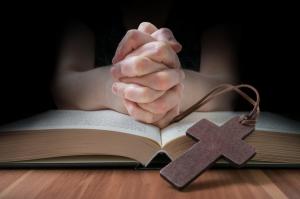
Skojec: Was discussing w/friend the traditional Catholic view that most of mankind is/will be damned. He replied, “The thought that most of creation is destined for eternal torment is bleaker and more nihilistic than an atheistic conviction that everything ends in nothing.” I agree 100%
Pauly: Why did he not create the universe/humanity in such a way that we would have to make an obvious choice to reject him? This could be imagined in a number of ways, but certainly communicating more directly with people is one possibility.
Skojec: I’ve been saying for years that the fall was so inevitable it’s impossible not to see it as a design flaw.
Kinyon: · I feel the same. And it’s hard to denounce universalists as heretics or “cafeteria Catholics” when I hope so very much that they’re right. And yet, I don’t want to leave the path of orthodoxy, nor encourage others to do the same. It is not an easy place to be.
Skojec: Exactly.
Dan the Jedi: Indeed if more souls end up in Hell than Heaven, it sure looks a lot like Satan “wins” in a real sense + the Incarnation was irresponsibly several thousand years late under such urgent conditions. I tend to think Heaven should obtain at *least* 2x as many souls, for fittingness.
Skojec: Dogmas are divinely revealed truths deemed necessary to believe for the sake of salvation. Who is in hell would never fit that category, even if it were standing room only up in there.
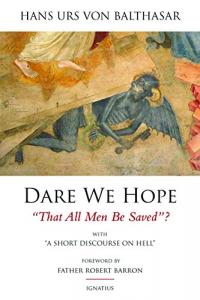
Shea: Today’s unpopular opinion: Von Balthasar’s, Barron’s, (and B16’s) views on hell are absolutely, 100%, perfectly within the pale of orthodoxy and their attackers are Pharisaic Inquisitors. There is no salvation outside the Church, but we know only where the Church is. We do not know where it is not.
Matty: The Church is the ark. One thing I wonder is what about the smaller life rafts outside the ark but attached with rope?
Shea: So cozy to sit by the fire and laugh at the desperate pleas of those losers dying in the snow and begging to come in.
The alliance of a theological theory about election and European notions of cultural supremacy has racked up a helluva huge bill that Euro-American Christianity is only now discovering is coming due with a butt ton of interest.
Matty: The Lord is certainly free to spend his blood as he sees fit!
Johnny: Only the LORD knows the boundaries of the people God has made peculiarly his own.
Danny: There are numerous passages that suggest that Christ will fill all things with all creation subject to him, which to me strongly implies that the boundaries of the Church are – or at least will be – infinite.
Fr. Ambrose: My view, and that of other priests, chimes with Saint Maximus the Confessor.
-oOo-
“One should pray that Apokatastasis [universal salvation] is true, but one would be foolish to teach it as doctrine.
-oOo-
Saint Maximus the Confessor’
“Expositions on Psalm 59”
Migne,Patrologia Graeca.

Saint Maximus the Confessor: Your Welcome!
Johnny: We dare to hope.
James: Hope yes…But I grew up with Uncle Joe across the pond, Chairman Mao, Corporal Adolph, Pol Pot, the Hutu murderers in Rwanda, The Khymer rouge…Ain’t gonna judge, but I’d be willing to bet a case of 1948 small bottle Coca Colas, those type and ilk ain’t gonna be in the “up” line.
(For younguns- Uncle Joe Stalin)
Fr. Ambrose: Our belief in human freedom means that we have no right to categorically affirm, “All must be saved.” But our faith in God’s love makes us dare to hope that all will be saved.
Is there anybody there? said the traveler,
Knocking on the moonlit door.
Hell exists as a possibility because free will exists. Yet, trusting in the inexhaustible attractiveness of God’s love, we venture to express the hope—it is no more than a hope—that in’the end, like Walter de la Mare’s Traveller, we shall find that there is nobody there. Let us leave the last word, then, with St Silouan of Mount Athos: “Love could not bear that… We must pray for all.” Bishop Kallistos Ware-Ware on universalism (clarion-journal.com)
Rogers: I hope hell is empty – and I’m going to live my faith out “in fear and trembling” so what’s the problem?
Brandon: Neither Bishop Barron nor von Balthasar claim the view is binding on everyone, only that it’s permissible and encouraged by the Church. But it’s not required. What’s problematic is when critics suggest the view is unorthodox, or even heretical.
Marky: If God loves everyone, does it not make sense that He desires for everyone to be saved? Btw, it is a petition to God. How can a petition be heretical?

Rogers: Sigh. It’s pretty simple: if hell isn’t packed then these “commentators” will feel all of their efforts (living the perfect Catholic life, publicly shaming ‘heretics’, chastising and blogging about all of the moral failures of everyone else, etc etc) were in utter vain. In order for all of this “suffering on earth” to be fair lots of regular, lukewarm Catholics have to go to hell. It’s actually terrifying, and it’s not like Patron accounts or “Premium Memberships” are involved or anything……..
Fr. Ambrose: Somewhere someone has provided a list of around 17 Church Fathers who taught universal salvation.
I think that one of the ‘marks’ of an Orthodox Christian psyche is an attraction to the temptation to believe in universal salvation (apokatastasis.) While the West tends towards restrictive salvation which reaches its culmination in the horrific teaching of Calvin’s double predestination, the East has been tempted in the other direction – towards universal salvation.
The Orthodox have always been attracted to the idea of “universal salvation”, that all will finally be recapitulated in Christ, both the earth-born and (possibly) the demons. You will find this in the Early Church. We know from Saint Augustine that it was a widely held teaching of what he calls the “fathers of the Church.” As you may imagine Saint Augustine was inclined to the opposite belief.
It resurfaces in the writings of the 20th century Parisian school of Russian theology. Russia’s young theologian-bishop Hilarion Alfeyev is very sympathetic to the teaching and has delivered lectures on it and written on it, drawing on Saint Isaac the Syrian.
Juan: I like to envision human virtuousness as a bell curve: saints at one end, sociopaths at the other, and in between all the “kinda mean well but would do better if they put away <insert favourite vice here>” people that constitute the majority.
Shea: You aren’t terribly far from Benedict’s speculations.
Kenny: Completely agree. Neither the universalist ‘all will be saved, don’t worry’, nor the ‘only one in every million billion will get saved, you’re all going to hell’ are useful in helping people grow in faith, as Bishop Barron has said.
Danny: Yes, we have to hope. Its possible God doesn’t even exist, or worse, it’s possible that Calvin’s God exists and most of us have been doomed to hell by his sovereign decree since the beginning of the world. Yet if we take God at his Word and apply everything, he has told us about himself using the faculties he endowed us with to know him better, I can’t come to any conclusion but universal reconciliation (which is not the same as universalism).
Wendy: I think the following is useful here: There is no salvation outside the Church, *and* wherever the Truths revealed by God through the Church are being lived out, there, in at least some measure, is the Church.
Jerm: That’s the best way I’ve heard it explained.
Blake: We are bound by the Sacraments, but God is not.

Peter: I would recommend here that we adopt the classic Catholic “both/and” approach.
If you were to ask the great Jesuit, Franciscan, Dominican, etc. missionaries of the New World why they were going out to preach the Gospel, baptize, and set up churches, they would surely have given a twofold answer: “We love the Lord and wish to multiply His disciples!” AND “We fear for the eternal salvation of these poor pagans.”
Sure, one could say “Ah yes, Augustinianism… and medieval pessimism… and Jansenism… no wonder they thought that…” But surely it smacks of condescension for us moderns, in our liberal Western comfort, to criticize missionaries who exerted unimaginable efforts and endured unspeakable sufferings to win a harvest of millions of souls for Christ, when we, after the Second Vatican Council, can’t even boast an infinitesimal sliver of their evangelizing dynamism or its success?
Heather: Peter Wouldn’t both/and be; I am not concerned that my personal success or failure to evangelize, or the other receiving/inability to receive the good news from me, will be the end of things because God does the healing, AND I should act as appropriate to try to show them the next step because that is also my next step towards goodness?
Blake H:. There have been so many who have been seriously hurt by Christianity – a fact that the previous year has made painfully clear. Many cultures were, instead of being brought to fullness by the grace of Jesus Christ, decimated. Land was stolen, peoples were raped and pillaged, they were forced into slavery, genocide was attempted on a large scale, etc. Others lived through horrible experience at the hands of the Church in orphanages, boarding schools and other institutions. Then there are the huge numbers that have been raped, molested, abused emotionally, spiritually or physically and basically been treat like garbage by the Church. To these people, Jesus Christ, Christianity, the promise of Salvation, the Church are things that carry painful memories and even foster a great deal of hate. Much healing needs to take place before the Gospel can be received.
Mark Wilson: Are all Catholic ways of thinking in the past correct when it comes to dealing with others and how to lead them to salvation? Was the idea of either avoiding non-Catholics so they don’t lead you to hell or converting them so they don’t go to the fires of hell beneficial to their souls and ours? Mark Shea writes,
“At Vatican II, the Church had to spell out a number of things latent in the Tradition, such as “slavery is gravely and intrinsically immoral, as is torture”. Lot of other horrors were likewise spelled out as gravely and intrinsically immoral too, and the whole kit and kaboodle was spelled out in reaction to the horrors of the 20th century and, above all, in reaction to the Church’s failure to spell it all out before it happened (recall that Hitler and Himmler and Goebbels were all products of Catholic Europe and received their education back when Everything was Great Before the Damn Liberals like Francis Took Over).
The Fathers at Vatican II looked back at the 20th Century and said, “Holy shit! We have got to attack the failures the Church permitted in the moral formation of the flock–failures that permitted Good Catholics to work the gas chambers and bomb Dresden and Hiroshima and taunt their Jewish neighbors as they were marched to Auschwitz and still present themselves for communion. So she produced such remarkable developments as the Decree on Ecumenism and Nostra Aetate, and Dignitatis Humanae, the Decree on Religious Liberty. Demonic Religion vs. the Decree on Religious Liberty – Stumbling Toward Heaven (markpshea.com)
Jeannette: “Evangelism” is the primary proclamation of the Gospel, by which people come to conversion to Christ. “Catechesis” is all the faith formation that follows, building upon that conversion. “Evangelization” is the ENTIRE, womb-to-tomb process of evangelism AND catechesis to bring souls deeply into God’s Presence. It’s the mission of the Church.
Mark Wilson: Sorry I love quotes. Mike Lewis writes,
“Successful evangelization today must respond creatively to unprecedented changes in the world, and should be mindful of the unique obstacles in each society. In the West, the evangelization challenge for the Church is to show that Catholicism is not an obsolete religion filled with superstitious bigots and conspiracy theorists. If we are unsuccessful, sharing the Gospel will be impossible. In the developing world, the evangelization challenges are to inculturate the faith and to liberate the oppressed. Failure to do this will lead the people to seek God elsewhere. Where the Church is tiny and persecuted, including China and parts of the Muslim world, the challenge is to show these societies that Catholics can live in fraternity as neighbors despite differences in belief, and can help work toward the common good of all. Failure to rise to this challenge means they will be crushed.
The declining Church in the West has suffered serious blows to its moral credibility in recent decades. This has resulted in declines in its ability to witness in the public square, its influence in halls of power, and its capacity to evangelize the culture. Historians and sociologists will research, write, and debate what caused the fall of Christendom for ages to come, but we Christians today don’t have the luxury of centuries to take stock of what went wrong if we want to survive this crisis. More importantly, if we fail to recognize how the Church is perceived by the wider society, our beloved faith will be reduced to little more than an afterthought by the prevailing culture in a generation or two.” What can we offer to the world? – Where Peter Is
Shea: Naive people do not believe in demons and sin, nor in the possibility that a human being can, with both eyes open, choose to damn his eternal soul to the everlasting fires of hell. Listen cupcake: there’s a reason *that* sacrifice by Jesus was necessary and not just some kind of three-day abstinence from sweets. Our species is *desperately* depraved. Thank God his love his greater still.
Mark Wilson: “St. Augustine was once asked, ‘What does God do to the souls in Hell?’ His response? ‘He loves them.’ The truth is, the flames of Hell are nothing more than the fires of God’s ‘constant and unending love’ licking at the hearts of those who refuse to melt.” I forget where I actually got this quote. But I like it.
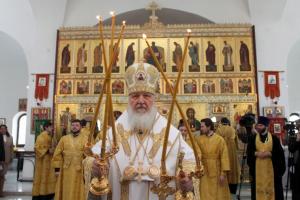
Photo (christiantoday.com)
Deacon Steve: In the Eastern Churches the fire of hell and the bliss of heaven are often understood as two different experiences of the same reality—the love of God, embraced by the Blessed, hated by the Lost. This very naturally supports a similar concept of purgatory.
FrNajim: I very much dislike when Purgatory is portrayed as hell-like torture. It simply is not. The suffering in Purgatory is a suffering of longing to be with the Beloved. The fire of Purgatory is the fire of love in Christ’s heart purifying souls.
Mark Wilson: This gives me great hope that God is reasonable in his punishments and that his love just can’t shut off. As they say on Catholic Answers, God Loves You and there is nothing you can do about it. Again a quote,
“The fires of hell, the suffering fires of purgatory, and the all-consuming bliss of beatitude are one thing, the same One. When the soul is freed from the confines, and limits, and filter of the physical body, it rushes back to the Love from whence it proceeded. That soul’s experience of God’s presence will be hell, purification, or the light of beatitude, depending on its conformity or lack of conformity to God’s love.Purgatory Is a Person, Not a Place – Ascension Press Media – Formation
Hey You: If this Eastern conception is true, that would mean that Hell is God shoving His presence down the throats of those who don’t want it for eternity. That’s hard to square God’s humility.
Deacon Steve: Objectively speaking, the infinite and absolute God can neither “shove” nor “withdraw” his presence anywhere; by definition, there is nowhere he is not. The common Western idea of hell as the absence of God, then, can only refer to the subjective experience of the Lost.
But perhaps this isn’t possible either. Perhaps in eternity there is no hiding from reality (love it or hate it), even in the interiority of subjectivity. Or perhaps both are imperfect, complementary ways of expressing the same reality.
Old-World American: Obviously none of this has been dogmatically defined so we are free to differ, but I would not discount the writings of the saints apparently against this. St. Faustina for instance:
Shortly after this, I fell ill [general exhaustion]. The dear Mother Superior sent me with two other sisters for a rest to Skolimow, not far from Warsaw. It was at that time that I asked the Lord for whom else should I pray for. Jesus said that on the following night He would let me know for whom I should pray.
[The next night] I saw my Guardian Angel, who ordered me to follow him. In a moment I was in a misty place full of fire in which there was a great crowd of suffering souls. They were praying fervently, but to no avail, for themselves; only we can come to their aid. The flames which were burning them did not touch me at all. My Guardian Angel did not leave me for an instant. I asked these souls what their greatest suffering was. They answered me in one voice that their greatest torment was longing for God. I saw Our Lady visiting the souls in PURGATORY. The souls call her “The Star of the Sea.” She brings them refreshment. I wanted to talk with them some more, but my Guardian Angel beckoned me to leave. We went out of that prison of suffering. [I heard an interior voice] which said, My mercy does not want this, but justice demands it. Since that time, I am in closer communion with the suffering souls. (Diary, 20)

Deacon Steve: Is this against what I said? Faustina says the greatest torment of purgatory is not some externally imposed punishment, but longing for God. No one in hell longs for God, which means the suffering of purgatory is fundamentally different from that of hell (cf. CCC 1031).
Old-World American: Well I was thinking a) that there could still be some externally imposed punishments, though they are not the greatest and b) that you wanted to maintain that hell is also not some externally imposed punishment
Deacon Steve: I “maintain” very little. It is enough to me to say with the Catechism that the “chief punishment of hell is eternal separation from God.” The Catechism doesn’t define the nature of the suffering in purgatory, but the saying of Faustina on this point seems reasonable to me.
Mark Wilson: We could go on and on. I could have added more oppositional thought, but wanted to spread some hope with spiritual positivity that is theologically allowed by Catholics who can express such thoughts and be in good standing with Christ and his church.
I’ll end with this.
Fr. Louis: I will reiterate what I have said elsewhere: there is nothing wrong with desiring that all individual human beings be saved (still less praying for it).
It would be wrong, however, to deny even the *possibility* of eternal condemnation.
As a theology professor of mine wisely put it: you can dare to hope that hell for human beings is empty; just don’t be the first one to fall in.”
And also this…
Jesus says the way to hell is broad and many find it and that the way to heaven is narrow and few find it. And he means it: you don’t get to heaven simply by being born, by being nice, or by oozing into an eternal growth experience. But “few” here does not mean that less than half of mankind will be saved. For God speaks as our Father, not our statistician. Even one child lost is too many, and the rest saved are too few. The good shepherd who left his ninety-nine sheep safe at home to rescue his one lost sheep found even 99 percent salvation too “few”.
– Peter Kreeft Hell (Feb 28 2018) Crossroads Initiative





